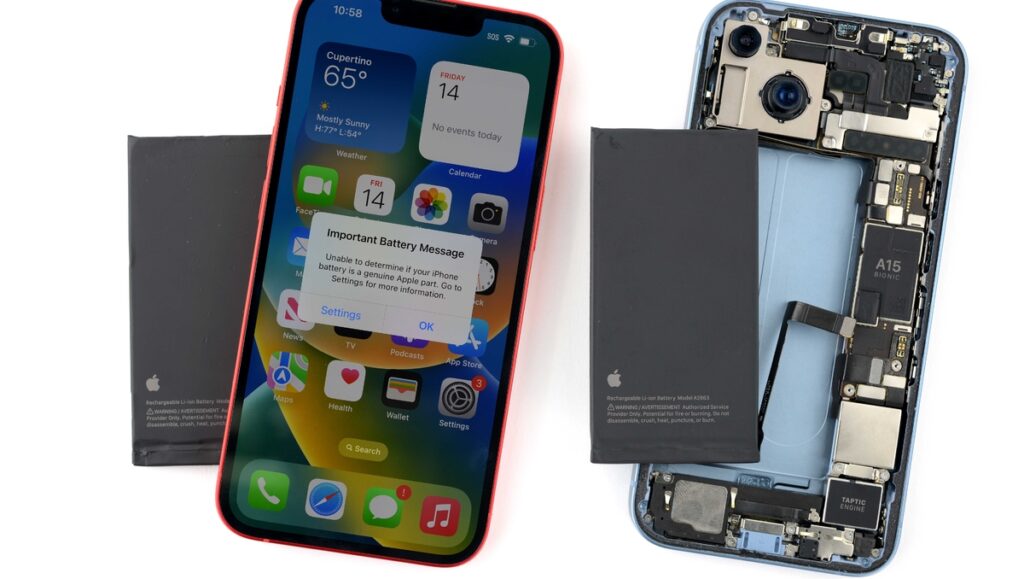If you've ever tried to repair an iPhone in recent years, there's a good chance you've encountered a message telling you that the new part you installed isn't “not original“or that she”cannot be verified“. In the worst case, you may even have lost some functionality due to a software crash operated by the operating system. These problems should become rarer in the future.
As the company announced in a press release published on April 11, 2024, it will be possible to use spare parts from the second-hand market to repair “some iPhone” from next fall. If the announcement is deliberately quite vague as to the devices affected by this measure, it seems that it concerns the iPhone 15 and future models to come.
Apple and repair, a complicated story
If you haven't followed the long battle that Apple has waged against the right to repair, the announcement may seem quite absurd to you. Unlike many mobile manufacturers, the Apple brand does not authorize the use of any part in the repair process of its iPhones. Many components are in fact linked to the phone via their serial numbers. Changing a battery, a screen or a fingerprint reader therefore requires purchasing a part validated by Apple which will then authorize the pairing of this new component with your phone, always via its serial number.
This practice known as “serialization” is under fire from critics, in Europe as well as across the Atlantic, due to the complexity it generates for independent repair shops or even in-house repairs. It prohibits the use of unofficial parts or parts from the second-hand market and places Apple in a position of essential intermediary For its part, the manufacturer has always defended itself by invoking a necessary control due to the safety risks that the use of parts from third-party brands can pose. .
What exactly is changing?
Good news that said, after having been criticized for years by specialists in the right to repair, iFixit in the lead, the serialization operated by Apple will end… Well, almost. In its announcement, Apple explains that the iPhone 15 and subsequent models can therefore be repaired with parts from other similar phones and that the pairing of the new component can be done directly on the phone instead of being validated upstream by Apple.
This should allow independent repairers to use parts from “broken” iPhones to repair others. And since providing the serial number of the phone will no longer be necessary to order a part (as was the case until now), stores will also be able to stock up on spare parts in order to repair more easily and quickly.
Still efforts to be made
However, all is not rosy. As iFixit points out, Apple is doing the bare minimum here to comply with the new pro-repair legislation emerging all over the world. And if opening repairs to official Apple parts is good news, iFixit regrets that the manufacturer still does not authorize the use of parts from third-party manufacturers.crucial to the development of the repair economy“and may cost”up to half the price of an official Apple component“.
iFixit also regrets that this new feature only concerns the iPhone 15 and subsequent models, while previous phone models also have their batches of serialized parts. It is also impossible to use the components of phones whose iCloud account has been locked. A decision undoubtedly taken to avoid the theft of iPhones and the resale of parts on the black market, but it could have been a way to reduce the mountains of electronic waste which accumulate on the planet.
But above all, this allows Apple to keep control of the spare parts market. Since components from third-party manufacturers will still not be compatible, Apple can continue to exercise very strict control over the price and availability of spare parts. “Apple is doing a half-measure here by unnecessarily complicating the process in order to look good in the face of legislators' desires to completely ban this serialization practice.“, denounces Kyle Wiens, CEO of iFixit.
Not sure either that the changes made by Apple will calm the ardor of Stop Planned Obsolescence which filed a complaint for “deceptive business practices” And “offenses assimilated to planned obsolescence“. The association criticizes Apple for “obstacles to repair“and to”access to spare parts“, charges that could still hold water, even in the face of this new policy.

